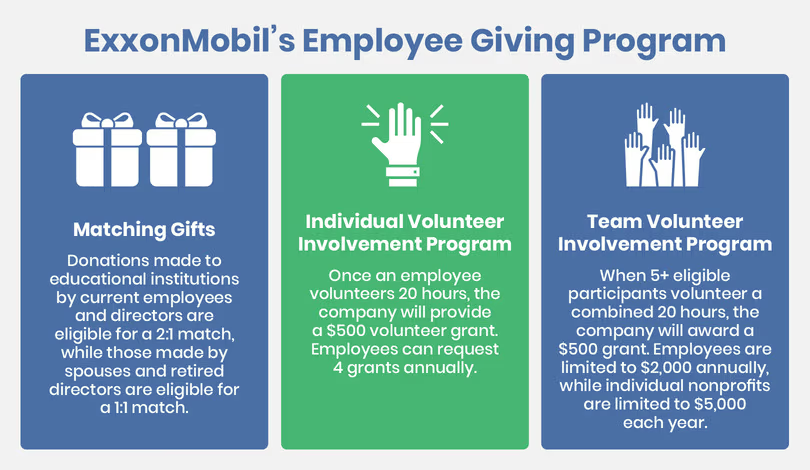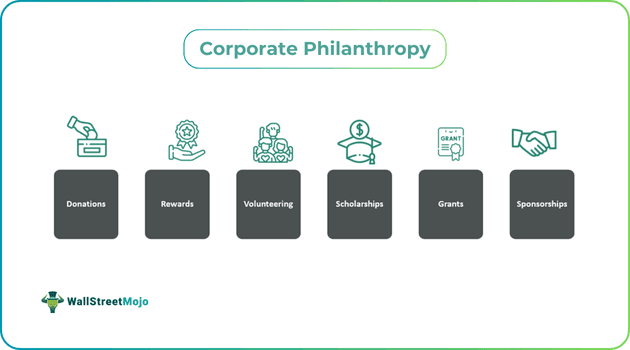Corporate philanthropy in tech: How industry leaders are making a difference
The Duty of Business Philanthropy in Fostering Sustainable Business Practices
Business philanthropy has become a crucial strategy for companies intending to integrate sustainability right into their procedures. By lining up business goals with social and ecological campaigns, companies can promote much healthier environments. This technique not just improves corporate reputation however additionally enhances stakeholder relationships. The real level of its impact on long-term company success remains to be checked out. What ingenious techniques are being adopted because of this?
Understanding Corporate Philanthropy and Its Importance
Company philanthropy works as a necessary system via which organizations can contribute to social health while improving their own credibilities. This practice involves companies designating resources, such as funds, time, or experience, to support community initiatives, philanthropic reasons, or social programs. By taking part in kind initiatives, business can deal with pressing social issues, such as education, health and wellness care, and ecological problems, thereby playing a critical duty in fostering positive change.
Corporate philanthropy can enhance employee morale and attract ability, as individuals progressively look for to work for socially accountable companies. It can likewise reinforce consumer commitment, as customers favor brands that demonstrate a dedication to making a difference. Eventually, comprehending the significance of corporate philanthropy lies in acknowledging its dual benefits: improving community well-being while concurrently enhancing business credibility and credibility in the eyes of stakeholders. This positioning of social responsibility with industrial passions highlights its relevance in today's company landscape.
The Link Between Corporate Philanthropy and Sustainability
While several business participate in philanthropy to enhance their public image, a deeper link exists between corporate philanthropy and sustainability. Company philanthropy usually straightens with lasting methods by sustaining efforts that attend to ecological and social challenges. When organizations purchase area projects, sustainable power, or curricula, they add to a healthier ecological community and culture. This dedication not just cultivates goodwill yet also enhances stakeholder partnerships, enhancing brand commitment.
Instance Researches: Successful Corporate Philanthropy Initiatives
Numerous firms have actually efficiently integrated kind initiatives into their business approaches, demonstrating the substantial advantages of such dedications. For circumstances, Microsoft has launched countless programs, such as its AI for Planet initiative, which supports environmental sustainability through modern technology. This strategy not just help preservation efforts yet likewise enhances Microsoft's track record as a leader in business duty.
Unilever's Lasting Living Plan highlights social and ecological effect, aligning its philanthropy with business goals. By funding tasks that boost health and cleanliness, Unilever strengthens its brand name while adding to worldwide health.
Another noteworthy instance is Patagonia, which vows 1% of sales to ecological reasons. This commitment reverberates with consumers, cultivating commitment and driving sales.
These study highlight that efficient company philanthropy can generate financial returns while promoting sustainable techniques, reinforcing the concept that honest company practices are advantageous for both culture and profits.
Structure Stronger Stakeholder Relationships Via Philanthropy
Philanthropy works as a necessary tool for business seeking to strengthen their relationships with stakeholders, as it fosters count on and demonstrates a commitment to social responsibility. By taking part in charitable initiatives, services can get in touch with local communities, boosting their reputation and motivating stakeholder commitment. This involvement frequently brings about meaningful interactions, developing a feeling of common worths between the firm and its stakeholders.
Humanitarian efforts can resolve details Click Here area needs, permitting organizations to contribute favorably to social obstacles. This participation not only showcases a business's ethical stance yet also aids in drawing in and keeping consumers who focus on social duty.
In addition, employees frequently feel more inspired next and engaged when they see their organization proactively taking part in philanthropic tasks, leading to an extra efficient workplace culture. Subsequently, company philanthropy becomes a calculated avenue for constructing stronger, extra resilient relationships with diverse stakeholder teams.
Determining the Effect of Business Philanthropy on Company Success
The connection between corporate philanthropy and stakeholder interaction establishes the stage for reviewing its influence on general organization success. Organizations frequently determine this influence via numerous metrics, consisting of brand name online reputation, employee fulfillment, and consumer loyalty. Philanthropic campaigns can improve a firm's image, cultivating count on among consumers and capitalists alike. Involved employees often tend to exhibit greater spirits and performance, directly associating to enhanced service performance.
Measurable analysis can also be employed, with organizations reviewing monetary returns against humanitarian expenditures. Research study indicates that companies with solid humanitarian commitments usually experience greater supply efficiency and decreased volatility. In addition, qualitative analyses, such as stakeholder comments, can offer insights into area understandings and lasting relational benefits.
Ultimately, gauging the effect of business philanthropy calls for a complex approach, integrating both qualitative and measurable data to assure an extensive understanding of its impact on service success. corporate philanthropy.
Regularly Asked Inquiries
Exactly How Can Small Services Involve in Corporate Philanthropy Effectively?

What Prevail Misconceptions About Business Philanthropy?

Exactly How Does Business Philanthropy Impact Worker Morale?
Business philanthropy favorably influences worker spirits by cultivating a sense of purpose, improving work contentment, and promoting loyalty. Workers often feel more engaged and inspired when their firm adds to social causes, developing a supportive work setting.
What Are the Tax Advantages of Company Philanthropy for Services?
Corporate philanthropy provides substantial tax obligation advantages for businesses, consisting of deductions on philanthropic contributions and possible decreases in gross income. These incentives motivate companies to participate in social efforts while all at once boosting their financial standing.
Exactly How Can Firms Choose Effective Philanthropic Allies?
Firms can select efficient philanthropic companions by assessing alignment with their worths, determining influence possibility, checking out economic transparency, and promoting strong interaction. This strategic approach improves partnership and assurances mutual benefits for both parties included.
Company philanthropy offers as an important device via which companies can add to societal health while improving their own credibilities - corporate philanthropy. Eventually, comprehending the relevance of corporate philanthropy exists in identifying its dual advantages: enhancing area welfare while at the same time improving service trustworthiness and credibility in the eyes of stakeholders. While lots of business involve in philanthropy to enhance their public picture, a much deeper link exists in between corporate philanthropy and sustainability. The connection between business philanthropy and stakeholder engagement sets the phase for reviewing its impact on general company success. Corporate philanthropy supplies considerable tax benefits for organizations, consisting of deductions on philanthropic payments and prospective reductions in taxable income